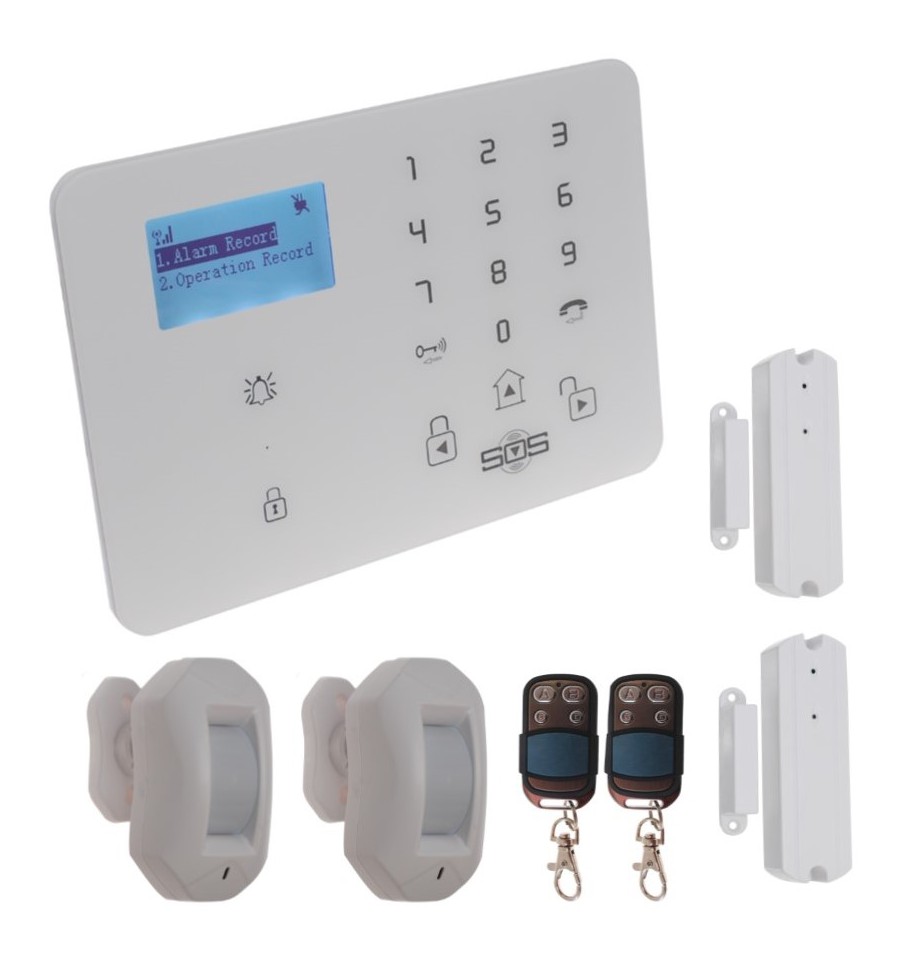What kind of home alarm should I get to protect my family?
Alarm systems are usually purchased as a result of a burglary or burglaries in your area. There is a wide choice of home security options available. This buying guide is to help you make an informed decision as to which type would suit you best.
At Simply Safes, we understand there are a lot of companies who will sell and install an alarm for you. In our experience, these companies often charge a subscription fee and will try to sign you into a maintenance contract. We have even heard of customers being charged for a call out to fix an alarm with a fault.
Our alarms are DIY friendly and have no monthly fees attached to them. We can even arrange a professional alarm installer for you if required, for added peace of mind.
Should I get a wired or wireless solution?
Wired alarms used to be the only option if you wanted a burglar alarm system. Technology has moved on considerably meaning you now do not need to run wires to all parts of your home. Our range of DIY alarms are all wireless alarms are easy to install. Some models have a smartphone app, which means you can control your alarm and receive notifications. Others just connect to your landline and are ideal for the older generation or those who do not have a good mobile signal.
It is a common misconception that customers worry about a wireless system being hacked. All the sensors use a unique ID to communicate with each other. These are the length of 4 mobile telephone numbers.
Shall I choose a smart alarm or another option?
If you opt for a smart alarm, this will connect with your Wi-Fi at home. It will also have the benefit of over the air updates as and when new features are introduced. Choosing a smart alarm might not be the best solution for everyone, so the alternative types of alarms are:
- Telecommunicating alarm - which will use your landline to alert you
- Dual communicating alarm - which you plug into a landline and also fit a SIM card
You can also fit a SIM card as a backup method into all our smart alarms. Ultimately your choice will hinge on how reliable the Wi-Fi is at your property and the mobile phone signal in your area.
Can I get notifications sent to my mobile phone?
Most models will send push notifications to your smartphone. The only alarm systems that will not do this is the telecommunicating versions. These are connected only to your landline so they will call you in the event a sensor is triggered while the alarm is armed. If you have a SIM only or dual communicating alarm, you must ensure that you have credit to receive the notifications.
Mobile phone signal in my area is not good, what are my options?
If you do not have a good mobile signal at your property, we would suggest you consider a system that uses a landline. This is more likely to give you better reliability of alerts.
Another alternative is to choose a smart alarm that connects to your Wi-Fi. In this instance you would not receive alerts in the event your broadband is not working.
The walls in my property are quite thick or have foil for insulation, will this cause a problem?
If you have thick walls, foil insulation or have several walls on the route to different sensors then you have a couple of options. In this instance you could choose an alarm system that has a range extender sensor in it, this will boost the signal quite significantly.
You may however, have to opt for a wired solution to prevent issues such as a sensor not alerting you at all or delays in the alert.
What other accessories would make my system better all round?
Typically home alarm systems used to just feature a door/window sensor and PIR motion detectors. As technology has advanced, other useful sensors have been introduced to offer you greater peace of mind. These include a smoke alarm to alert you in the event of a fire and a water detector. We at Simply Safes feel a water sensor is very useful as they can be placed in various locations such as behind a washing machine, under a sink or in a boiler cupboard. This will give you more advanced warning of a leak that could save you potentially thousands of pounds of money in damages.
I live in an apartment, am I allowed to put a siren box outside?
By law, if you own a flat or apartment then you are not allowed to place a siren intruder alarm outside. All our alarms feature control panels that internal sirens, on most of these models you can adjust the volume.
All the sensors in the kit look quite tricky, how difficult are they to install?
Usually in an entry level alarm kit you will find there are the following sensors:
- Door or window sensor
- PIR motion sensor
- Siren box
These are all fairly straightforward to install if you are competent at DIY. To install a door or window sensor is really easy. There is 3M sticky tape on the rear which you peel off and fit. The motion sensor can also be secured with 3M adhesive tape, however it is best secured to a wall using the bracket supplied. This is a fairly simple process of drilling two holes and using the screws and rawl plugs included. Perhaps the most tricky sensor from the list is a siren box because you will need a ladder and a head for heights to secure it to the outside of your property. Other than that, you're one step closer to having a secure smart home.
I live in a large property and want to also protect an outbuilding, is this possible?
To help you protect your property you can add up to 50 sensors on most of the alarms that we sell. This gives you complete flexibility to customise the system around your needs. If you have a garden shed or outbuilding such as a barn then you may require a range extender sensor. This will boost the signal to 300 metres and is available with selected ranges.
Will the motion sensors work at night and will they detect pets?
Yes, sensors are designed to work in all kinds of light and are primarily there to detect movement. Some motion sensors are pet friendly up to 25kg which is a cocker spaniel size, but not all ranges are so ensure you check this before purchasing.
Can I subscribe to Police response?
Our range of DIY alarms can not be connected to a monitoring service, should you require this type of alarm you will need to have a professional range that is installed by a registered alarm engineer. This will of course be reflected in the cost and you might be limited in functionality compared to the DIY range we offer.
Will the alarm system link to a video doorbell?
The ERA Homeguard Pro alarm kits and the ERA Doorcam will eventually be under one smartphone app, currently they are separate. ERA also have an internal wireless camera that is integrated into the Homeguard app.
Our summary
As with most products, the kind of alarm system that will suit one customer might not suit another. Rest assured though, that we have a system to help you protect your home better.
We hope that this buying guide has helped you to understand the types of alarms that are available on the market better and how you can add additional sensors to suit your property.
Should you require any further assistance to help you make a choice then please do not hesitate to contact one of our friendly sales team.









 It’s time to spring clean your caravan or motorhome
It’s time to spring clean your caravan or motorhome













 If a small lithium ion battery such as a smartphone or power bank is on fire, you can try to extinguish it yourself. Make sure that you do not inhale any hazardous substances and think about your own safety. At the time of writing this article, the fire service is still busy researching the best extinguishing method for lithium batteries. Lithium battery extinguishing agents that are most effective now are the following.
If a small lithium ion battery such as a smartphone or power bank is on fire, you can try to extinguish it yourself. Make sure that you do not inhale any hazardous substances and think about your own safety. At the time of writing this article, the fire service is still busy researching the best extinguishing method for lithium batteries. Lithium battery extinguishing agents that are most effective now are the following.



 ETL is an independent company that tests and grades each safe that has been provided by the supplier. After the testing has been completed they will give each product a certification mark such as below.
ETL is an independent company that tests and grades each safe that has been provided by the supplier. After the testing has been completed they will give each product a certification mark such as below.

Add a comment